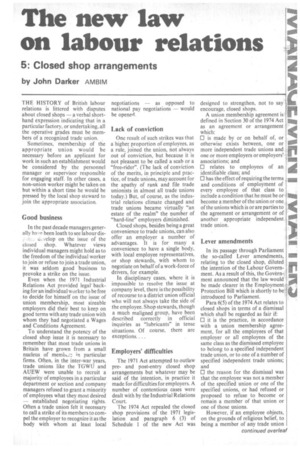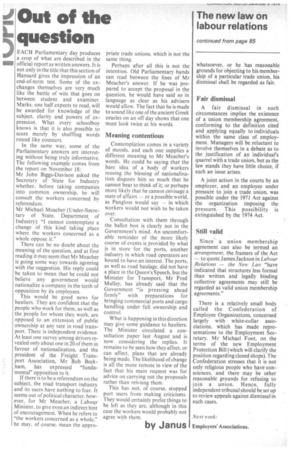The new law on labour relations
Page 87

Page 88

If you've noticed an error in this article please click here to report it so we can fix it.
5: Closed shop arrangements
by John Darker AMBIM THE HISTORY of British labour relations is littered with disputes about closed shops — a-verbal shorthand expression indicating that in a particular factory, or undertaking, all the operative grades must be members of a recognized trade union.
Sometimes, membership of the appropriate union would be necessary before an applicant for work in such an establishment would be considered by the riersonnel manager or supervisor responsible for engaging staff. In other cases, a non-union worker might be taken on but within a short time he would be pressed by the local shop steward to join the appropriate association.
Good business
In the past decade managers generally have been loath to see labour disvelop on the issue of the closed shop. Whatever views individual managers might hold as to the freedom of the individual worker to join or refuse to join a trade union, it was seldom good business to provoke a strike on the issue.
Even when the 1971 Industrial Relations Act provided legalbacking for an individual worker to be free to decide for himself on the issue of union membership, most sizeable employers did their best to keep on good terms with any trade union with whom they had negotiated a Wages and Conditions Agreement.
To understand the potency of the closed shop issue it is necessary to remember that most trade unions in Britain have grown from a small nucleus of inernbL:c in particular firms. Often, in the inter-war years, trade unions like the TGWU and AUEW were unable to recruit a majority of employees in a particular department or section and company managers refused to grant a minority of employees what they most desired — established negotiating rights. Often a trade union felt it necessary to call a strike of its members to compel the employer to recognize it as the body with whom at least local negotiations — as opposed to national pay negotiations — would be opened.
Lack of conviction
One result of such strikes was that a higher proportion of employees, as a rule, joined the union, not always out of conviction, but because it is not pleasant to be called a scab or a "free,rider". (The lack of conviction of the merits, in principle and practice, of trade unions, may account for the apathy of rank and file trade unionists in almost all trade unions today.) But, of course, as the industrial relations climate changed and trade unions became virtually "an estate of the realm" the Dumber of "hard-line" employers diminished.
Closed shops, besides being a great convenience to trade unions, can also offer an employer a number of advantages. It is for many a convenience to have a single body, with local employee representatives, or shop stewards, with whom to negotiate on behalf of a work-force of drivers, for example.
In disciplinary cases, where it is impossible to resolve the issue at company level, there is the possibility of recourse to a district union official who will not always take the side of the employee. Shop stewards, though a much maligned group, have been described correctly in official inquiries as "lubricants" in tense situations. Of course, there are exceptions. . . .
Employers' difficulties
The 1971 Act attempted to outlaw preand post-entry closed shop arrangements but whatever may be said of the intention, in practice it made for difficulties for employers. A number of contentious cases were dealt with by the Industrial Relations Court.
The 1974 Act repealed the closed shop provisions of the 1971 legislation and paragraph 6 (3) of Schedule 1 of the new Act was designed to strengthen, not to say encourage, closed shops.
A union membership agreement is" defined in Section 30 of the 1974 Act as an agreement or arrangement which: O is made by or on behalf of, or otherwise exists between, one or more independent trade unions and one or more employers or employers' associations; and O relates to employees of an identifiable class; and 0 has the effect of requiring the terms and conditions of employment of every employee of that class to include a condition that he must be or become a member of the union or one of the unions which is or are parties to the agreement or arrangement or of another appropriate independent trade union.
Lever amendments
In its passage through Parliament the so-called Lever amendments, relating to the closed shop, diluted the intention of the Labour Government. As a result of this, the Government announced that the law would be made clearer in the Employment Protection Bill which is shortly to be introduced to Parliament.
Para 6(5) of the 1974 Act relates to closed shops in terms of a dismissal which shall be regarded as fair if: O it is the practice, in accordance with a union membership agreement, for all the employees of that employer or all employees of the same class as the dismissed employee to belong to a specified independent' trade union, or to one of a number of specified independent trade unions; and O the reason for the dismissal was that the employee was not a member of the specified union or one of the specified unions, or had refused or proposed to refuse to become or remain a member of that union or one of those unions.
However, if an employee objects, on the grounds of religious belief, to being a member of any trade union continued overleaf whatsoever, or he has reasonable grounds for objecting to his membership of a particular trade union, his dismissal shall be regarded as fair.
Fair dismissal
A fair dismissal in such circumstances implies the existence of a union membership agreement, conforming to the definition cited and applying equally to individuals within the same class of employment. Managers will be reluctant to involve themselves in a debate as to the justification of an individual's quarrel with a trade union, but as the law stands they have little choice, if such an issue arises.
A joint action in the courts by an employer, and an employee under pressure to join a trade union, was possible under the 1971 Act against the organization imposing the pressure. This possibility is extinguished by the 1974 Act.
Still valid
Since' a union membership agreement can also be termed an arrangement, the framers of the Act — to quote James Jackson in Labour Relations — the New Law "have indicated that structures less formal than written and legally binding collective agreements may still be regarded as valid union membership agreements."
There is a relatively small body called the Confederation of Employee Organizations, concerned largely with white-collar associations, which has made representations to the Employment Secretary. Mr Michael Foot, on the terms of the new Employment Protection Bill (which will clarify the position regarding closed shops). The Confederation stresses that it is not only religious people who have consciences, and there may be other reasonable grounds for refusing to join a union. Hence, fully independent tribunal should be set up to review appeals against dismissal in such cases.
Next iveek: Employers' Associations.












































































































































